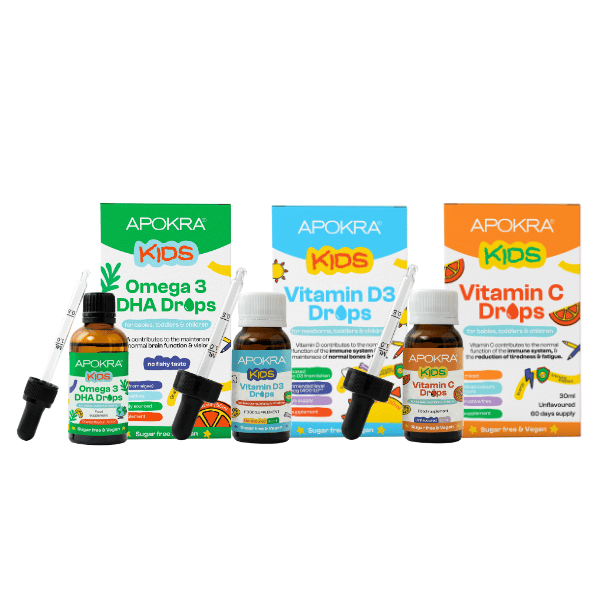Top 6 Vegan Sources of Omega-3: Get Your Essential Fatty Acids from Plant-Based Foods

Omega-3 fatty acids are essential nutrients that play a crucial role in maintaining overall health and well-being. They are associated with several health benefits, including supporting brain health, eye health, reducing inflammation, and maintaining heart health.
Both vegan and vegetarian diets are limited to the use of plant-based omega-3 which generally provide the less potent form of omega-3 named alpha-linolenic acid (ALA). ALA must be converted by the body into DHA and EPA which are the omega-3 fatty acids most associated with positive health benefits.
Can you get omega-3 from vegan diet?
There are numerous nutritious plant-based sources of omega-3 that can be incorporated into a vegan diet to provide ALA. Plant-based algal oil is considered one of, if not the most potent vegan alternative to fish-oil as it provides both active forms of omega-3 DHA and EPA.
Below, we will explore the top 6 vegan omega-3 rich foods, along with their approximate omega-3 content, to help you when deciding what vegan sources of omega-3 to include in your diet. We will also look at some of the health benefits of omega-3.
Algal Oil:
Algal oil is a vegan source of omega-3s that is derived from algae, making it both a sustainable and ethical source. It is rich in DHA, which is a type of omega-3 fatty acid that is essential for brain and eye health. DHA is a crucial component of cell membranes in the brain and is associated with cognitive function and mental well-being. Algal oil is available in supplement form and can be easily incorporated into a vegan diet to ensure adequate intake of DHA.
Approximate Omega-3 Content: Comes in supplement form and brands provide between 250-900mg of DHA and EPA combined per teaspoon of algal oil. The EFSA recommend 250mg of DHA daily to achieve the brain and vision health benefits (1)
Chia Seeds:
Chia seeds are small black seeds that are packed with nutrition, including omega-3 fatty acids. These seeds were even used by the Aztecs for their nutritional and water retaining properties helping to keep the body hydrated on long journeys. They are a rich source of ALA, which is a type of omega-3 fatty acid that can be converted to DHA and EPA in the body, although as mentioned earlier this process is in-efficient. Chia seeds are also high in fiber, protein, antioxidants, and other essential nutrients, making them a superfood for overall health. Chia seeds can be soaked, ground, or added to various recipes such as smoothies or in baking.
Approximate Omega-3 Content: 28g of chia seeds provide approximately 5g of Omega-3 (2)
Flaxseeds:
Flaxseeds are another excellent vegan source of omega-3 fatty acids, particularly ALA. They are small, brown or golden seeds that are rich in healthy fats, fiber, protein, and other essential nutrients. Flaxseeds need to be ground before consumption to release their omega-3 content, as the whole seeds may pass through the digestive tract undigested. Ground flax seeds can be added to smoothies, porridge oats or yogurt. Flaxseed oil is another option but can expire more quickly and should be stored in the refrigerator.
Approximate Omega-3 Content: 10g of ground flax seeds contains approximately 2.35g of ALA Omega-3 (3)
Walnuts:
Walnuts are a delicious and nutritious vegan source of omega-3 fatty acids. They are a good source of ALA, as well as other healthy fats, protein, fiber, antioxidants, and other essential nutrients. Walnuts can be enjoyed on their own or added to salads, stir-fries, or used in baking. They can also be ground into walnut butter or used as a topping for porridge oats or yogurt. Studies have shown that incorporating walnuts into your diet may help improve cognitive function and brain health due to their omega-3 content.
Approximate Omega-3 Content: 28g of walnuts provide approximately 2.57g of ALA Omega-3 (4)
Edamame:
Edamame, which are young soybeans, are another great vegan source of omega-3 fatty acids. They are rich in ALA, along with protein, fiber, antioxidants, and other essential nutrients. Edamame can be boiled or steamed and enjoyed as a snack, added to stir-fries, salads, or used in soups. They can also be blended into a creamy dip or spread. Edamame is a versatile and delicious option to incorporate omega-3s into your plant-based diet.
Approximate Omega-3 Content: Half a cup of frozen edamame beans contains 0.28g of ALA (5)
Hemp Seeds:
Hemp seeds are tiny, nutrient-packed seeds that are a great vegan source of omega-3 fatty acids. They are rich in ALA, as well as protein, fiber, healthy fats, and other essential nutrients. Hemp seeds have a slightly nutty flavour and can be added to smoothies, salads, porridge oats, or used in baking. They can also be blended into hemp seed butter or used as a topping for yogurt or desserts.
Approximate Omega-3 Content: 30g of hemp seeds contain approximate 2.6g of ALA (6)
Omega-3 sources are not just limited to fish and fish oil and there are several good sources of omega-3s that are suitable for vegans and vegetarians. Algal oil, chia seeds, flax seeds, walnuts, edamame, and hemp seeds are all excellent vegan sources of omega-3s. They are rich in ALA, which can be converted to other forms of omega-3s in the body, although the conversion rate may vary. Algal oil is considered comparable in potency compared with fish oil as it provides both the active forms of omega-3; DHA and EPA. This sets it apart from the other plant based sources of omega-3 that only provide ALA.
Incorporating these foods into your plant-based diet can help ensure adequate intake of omega-3 fatty acids and support optimal brain health, eye health and cognitive function.








Comments
Leave a comment
Your Email Address Will Not Be Published. Required Fields Are Marked *